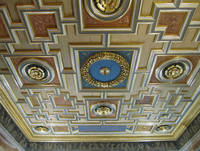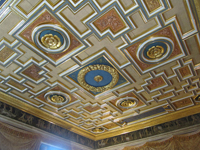ROOM OF FRIEZE
The room of the Frieze is accessed from the Loggia of Psyche. Its appearance suggests that it was the private studio of Agostino Chigi.
 |
 |
| The ceiling - click to enlarge the pictures |
The frieze, painted by Baldassarre Peruzzi around 1508, runs on top of the four walls, for that reason it is not easy to read, so it would be useful to have a pair of binoculars, or alternatively using the zoom photograph and enjoy the freeze at home.
In this regard, it is good to know that you can photograph the frescoes in the Villa, as long as you do not use the flash.
The frieze, of great refinement, show on the north wall and the east wall the “Labours of Hercules”, followed by various mythological episodes.
NORTH WALL
From the north wall we see:
Hercules and the Centaurs;
Hercules and the Lion of Nemea;
Hercules and the Birds Stinfalidi;
Hercules and Echidna;
Hercules and Cerberus;
Hercules and Diomedes;
Hercules and the Hydra of Lerna;
Hercules and the Bull of Crete;
EHercules and Antaeus;
Hercules and Geryon.
EAST WALL
Hercules which replaces Atlas;
Hercules and the wild boar of Erimano;
The Rape of Europa;
Danae welcomes Jupiter in the form of golden rain;
The myth of Semele: Juno and Semele, Semele struck by Jupiter;
Diana and Actaeon transformed into a stag;
Midas with donkey ears;
The contest between Apollo and Pan;
The punishment of Midas;
Neptune and Amphitrite with his son.
SOUTH WALL
On the south wall Peruzzi has painted a series of imaginative episodes set in the sea.
WEST WALL
Nymphs and satyrs;
Bacchus and Bacchae;
Apollo flaying Marsyas;
The myth of Meleager: Atalanta, Meleager and the Calydonian boar,
Contention between Meleager and uncles,
The Fates and the mother of Meleager;
The myth of Orpheus:
Orpheus charming the animals,
Orpheus looks back at Eurydice,
Pluto brings Euridice into the hades,
Death of Orpheus at the hands of Tracie women.
 |
| The myth of Orpheus - click to enlarge picture |
Great is the refinement of the frieze, but truly unforgettable is the expressiveness of the movement of Eurydice inside the myth of Orpheus.
back |

